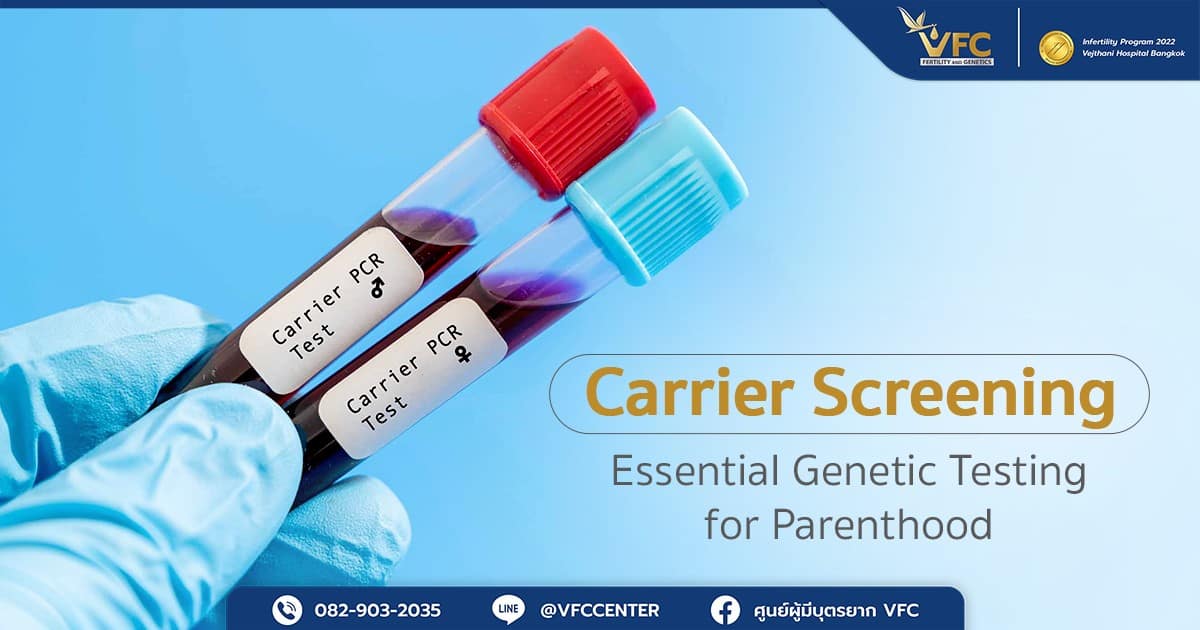

Having a child is a joyous experience for many couples, but not all couples can be confident that their child will be born healthy. This is especially true when one or both parents may carry hidden genetic mutations they were unaware of. The risk of passing on genetic diseases becomes a concern for many, which is why genetic carrier screening was developed. It provides peace of mind before pregnancy and helps make family planning safer.
What is Carrier Screening?
Carrier screening is a genetic test that identifies whether an individual is a “carrier” of a genetic mutation and may potentially pass on a genetic disease to their child. Even if someone is a carrier, they may not show symptoms of the disease. This test allows couples planning to have children to understand the risks and potential for a safe pregnancy, supported by fertility technologies like in-vitro fertilization (IVF) and ICSI. It can be combined with preimplantation genetic testing (PGT) to reduce the risk of passing on genetic conditions that could impact the child’s quality of life in the future.
Difference Between Carrier Screening and General Health Checkups
Typically, general health checkups may only include screening for specific diseases, such as genetic conditions like thalassemia, which is common in Thailand. However, these checkups have limitations and can only detect a limited number of diseases at a time. On the other hand, cutting-edge technology like Next-Generation Sequencing (NGS) can test for hundreds of genes simultaneously, offering a broader and more comprehensive analysis.
This advancement in technology makes carrier screening more effective, providing clearer, more accurate, and comprehensive results. It is an essential tool that helps reduce the health risks that may affect your child in the future.
Schedule a consultation and genetic carrier screening with VFC here.
The Importance of Carrier Screening Before Planning for Parenthood
While pregnancy is a joyous time, the unseen genetic risks can become a source of worry later on. However, undergoing carrier screening is a crucial preventative step that can reassure couples in several ways:
1. Reduces the Risk of Passing Severe Diseases to Your Child
Even if parents don’t show symptoms of a disease, if both carry the same type of abnormal gene for a specific condition, their offspring have a high chance of inheriting that disease, following genetic principles. For instance, in the case of Thalassemia, if both parents are carriers, the child might develop severe anemia requiring lifelong treatment. Carrier screening, therefore, helps to screen and assess the initial risk, preventing severe diseases even before conception.
2. Enables Appropriate Family Planning
If genetic testing reveals a risk of passing a disease to the child, the couple can plan a safer and more confident pregnancy with medical assistance. This can involve using methods like ICSI combined with Preimplantation Genetic Testing (PGT-A and PGT-M to screen embryos and reduce the chances of transmitting abnormalities to the baby. This minimizes the burden of future care and increases the likelihood of a safe pregnancy. Couples may also opt for other preventative measures recommended by a physician, such as prenatal diagnosis or preparing a treatment plan early on.
3. Prepares for the Possibility of a Sick Child
If a genetic abnormality does occur in the child in the future, having undergone carrier screening beforehand provides the family with information and preparedness to cope immediately. This includes planning for treatment, learning about condition-specific care, emotional preparation, and managing the costs of treatment. Having this information can reduce anxiety and boost confidence in caring for a child who may have a genetic condition.
Schedule a consultation and genetic carrier screening with VFC here.
Common Genetic Diseases Found Through Carrier Screening

- Thalassemia: Highly prevalent in Thailand and Southeast Asia. Children born with the severe form of the disease require lifelong regular blood transfusions.
- Spinal Muscular Atrophy (SMA): Caused by an abnormality in the SMN1 gene, which affects the function of motor nerve cells. Children with this disease often lose movement and may have a short lifespan.
- Hereditary Hearing Loss: Children with abnormalities in this group of genes often have hearing problems from an early age. If not detected and treated promptly, it can impact language development and learning.
These genetic diseases are just a few of the commonly found conditions. They are examples that reflect how in-depth genetic carrier screening is a medical option that genuinely helps reduce risk and increases the chance for a child to be born healthy.
Carrier screening is a significant step for couples who want to plan their family meticulously, as it helps reduce the risk of transmitting genetic diseases and enhances confidence in having children.
If you require a consultation for infertility or advice regarding pre-conception genetic testing, you can receive services at VFC Center, the Center for Assisted Reproductive Technology (V Fertility Center). We are ready to provide personalized care, from genetic analysis and fertility assessment to determining the appropriate treatment plan, led by a multidisciplinary team of reproductive specialists. This includes comprehensive infertility screening in Thailand to ensure every couple has the opportunity to welcome the healthiest and most complete baby possible.
Article by Dr. Worawat Siripoon
For consultations or appointments, contact:
VFC Center – V-Fertility Center
Hotline: 082-903-2035
LINE Official: @vfccenter
FAQs
Q: Who should consider Genetic Carrier Screening?
Any couple planning to conceive can undergo the test, even without a family history of genetic disease, as carriers may show no symptoms at all. It’s especially recommended for couples with a history of recurrent miscarriages, those with family members affected by a genetic disease, or those pursuing In Vitro Fertilization (ICSI) to thoroughly assess the risks.
Q: How accurate is Carrier Screening?
Current use of Next-Generation Sequencing (NGS) technology allows for the detection of hundreds of mutations simultaneously in a single test. It boasts high accuracy and provides more in-depth information than general health checkups. However, accuracy also depends on the laboratory and the interpretation of the results by the medical team involved.
Q: Does Carrier Screening differ from general pre-conception health checkups?
Yes, they are distinctively different. Routine pre-conception health checkups usually include blood tests to screen for different abnormalities, like infectious diseases or organ function. In contrast, genetic carrier screening focuses on gene analysis to determine the chance of passing on a genetic disease to the child. It is a more in-depth perspective and helps plan for a safe pregnancy.
Q: What should we do if both partners are found to be carriers of the same disease?
The couple still has an opportunity to have a healthy baby. They can choose to utilize Assisted Reproductive Technology (ICSI/IUI) combined with Preimplantation Genetic Testing (PGT-A and PGT-M) to identify embryos without the disease or with carrier status. Alternatively, they may choose other methods, such as Prenatal Diagnosis, as advised by a specialized physician, to ensure the safest possible pregnancy.

OBSTETRICS AND GYNAECOLOGY-REPRODUCTIVE MEDICINE





No Comments
Sorry, the comment form is closed at this time.